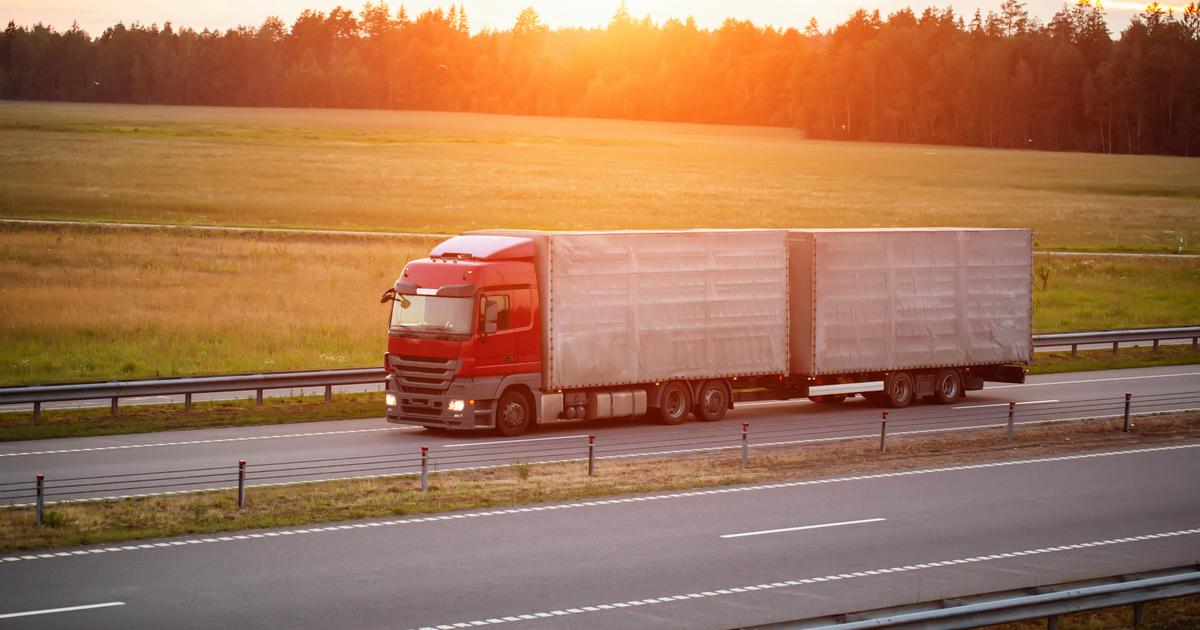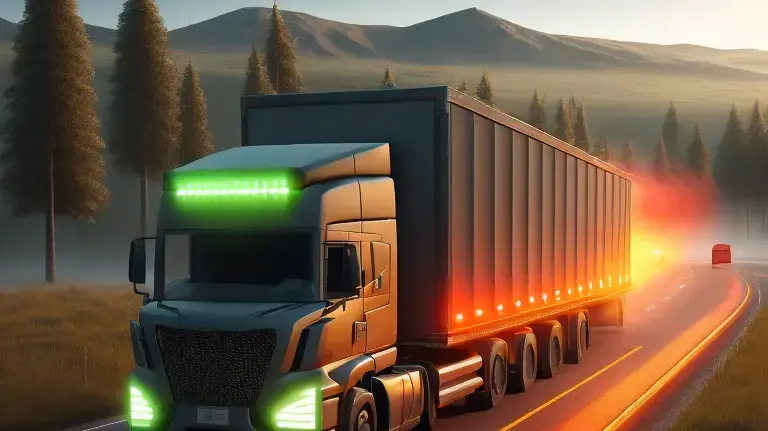"He just pulls the 40 tons away" - MAN boss Vlaskamp on electric trucks
Created: 09/21/2022, 13:11
How to charge it: At the IAA, a MAN employee holds a connector from the MCS megawatt charging system in front of a new MAN E-Truck electric truck.
© Julian Stratenschulte/dpa
At the IAA, MAN presented the first fully long-distance electric truck.
MAN boss Alexander Vlaskamp describes the change in an interview.
Hanover – The state capital of Lower Saxony is in the grip of trade fair fever this week: Truck and bus manufacturers from all over the world are exhibiting their new vehicles at the IAA Transportation.
The big topic: Electromobility.
Because after the cars, the EU is also tightening its limits for commercial vehicles, from 2030 truck manufacturers have to reduce their fleet emissions by 30 percent.
"It can't be done without electric vehicles," says MAN boss Alexander Vlaskamp.
MAN therefore presented the first fully long-distance truck with a daily range of up to 600 to 800 kilometers at the IAA on Monday.
It will be manufactured in Munich from 2024.
"Compared to the diesel, it is much quieter and more comfortable"
Mr. Vlaskamp, today you presented a heavy-duty electric truck for long-distance transport.
Do you have a truck license and have you driven it yet?
Naturally!
Compared to the diesel, it is much quieter and more comfortable.
The torque is instantaneous and it's really impressive how it just pulls away over 40 tons.
Their electric truck is scheduled to go into series production in 2024.
How high will your proportion of e-trucks then be?
It's difficult to predict right at launch.
For this reason, both combustion and electric vehicles are initially assembled on one line at the Munich plant.
Diesel engines and battery packs will then also be manufactured at the same time in the engine plant in Nuremberg.
This allows us to react flexibly to demand.
In 2030, around half of the trucks sold will probably be electric.
We have changed many production processes, trained our employees in Munich and Nuremberg and are ready for the ramp-up.
Due to the lack of range, electric trucks have so far only been able to empty garbage cans or deliver packages.
What is possible with the new truck?
Everything from distribution transport for parcels, garbage trucks and tippers to long-distance steel transport.
Because the daily range is up to 800 kilometers, later it will even be over 1000.
The bottom line is that we introduce the truck along with the megawatt standard in charging.
So far, trucks can only charge with around 350 kilowatt hours.
It then takes a few hours for the battery to be fully charged.
Megawatt charging is more than twice as fast.
So you have to recharge for the daily range?
Exactly.
But that is also practical.
Truck drivers in Europe have to take a 45-minute break after 4.5 hours behind the wheel anyway.
Depending on the charge and route profile, the megawatt charging gives you enough energy for a range of almost 500 kilometers in the batteries.
That's enough for the next route and also provides the additional energy that refrigerated trucks or concrete mixers, for example, need to operate their bodies.
also read
Putin's gas plan about to end: Russia's blackmail is unlikely to work
Pension: These cohorts are allowed to retire before the age of 67
What is the customer feedback like?
Do many want to switch?
The interest is very high!
Many consumers want their organic milk, their furniture or their food to be transported in a climate-neutral manner.
That’s why the first thing I’m asked about at every customer meeting is electric trucks.
We then take a close look at the customer's tours and try not only to provide the right vehicle, but also to develop a charging concept for the driving profile.
So: Where and when is the best time to charge?
Do you have to build pillars in the trucking yard or at the loading docks?
Their trucks are also to be used in long-distance transport.
So far, however, there are exactly two public charging stations for e-trucks in Germany.
That's not enough for the front and the back.
It will take years to set up the charging network, which is why we absolutely have to start today.
We therefore advise our customers accordingly and also equip our branches and workshops with charging stations ourselves, which we then open to customers.
In addition, we are investing 500 million euros with the Traton Group in a joint venture with Volvo and Daimler in the construction of more than 1,700 charging stations along the main transport routes in Europe, each station having several charging stations for electric trucks.
The first should be active soon.
This is also a clear signal to politicians: We are getting started with e-mobility, the power grid must finally be expanded!
But that's not it.
Why?
As so often, the devil is in the details and our bureaucracy slows us down.
In the vast majority of cases, there are no permits, for example to lay pipes and lines in the ground.
In addition, networks have to be expanded and transformers upgraded.
Are you confident things are getting better?
Yes, because everyone wants.
Climate change has long been here, the EU has set clear emission standards and more and more customers are demanding a climate-neutral transport chain.
In the passenger car industry, the charging structure also works.
So why shouldn't that work in truck traffic?
“In the future, truck drivers will have to act like airline captains”
The industry association ACEA calls for 42,000 truck charging points in Europe by 2030. Is the goal realistic?
That sounds like a lot, but it's doable.
Measured against today's number of diesel fuel pumps, 42,000 charging stations isn't all that many, as you always build several stations at one station.
The good thing is that thanks to digitization and telematics, we know the routes that haulage contractors take, and we know where the pillars should be and how much energy is needed there.
Together with the operators of the power grids and charging stations, we can therefore plan very well.
Many rest areas are already completely overcrowded.
How will it be if there is also loading?
In the future, truck drivers will have to act like airline captains.
They don't fill their tanks to the max either, but plan their fuel requirements and their stopovers along the routes meticulously.
Accordingly, the dispatchers and truck drivers have to think more carefully in advance which stops they need for which routes and then reserve the required columns there.
This will be possible with our new digital platforms in the vehicles.
They can be used to ensure that the vehicles stand still as little as possible.
An electric truck is about twice as expensive as a diesel truck.
And electricity prices are skyrocketing.
Will the energy crisis become a problem for e-mobility?
Compared to diesel, the kilowatt hour of electricity is still cheap.
Finally, the cost of diesel has increased significantly.
Emissions trading will also soon be extended to the transport sector and you have to pay for every tonne of CO2 emitted on the road.
This brings the diesel vehicles further cost disadvantages in operation.
In addition, the price of wind and solar power is currently heavily dependent on the gas price due to the way the electricity market is designed.
If that were not the case, green electricity could be much cheaper.
Politicians need to change that too.
Is there enough electricity for the electrification of freight transport?
In theory, that would work. If you were to electrify all freight transport with green electricity, you would need about a third of the wind power generated in Germany.
But since other sectors also need renewable electricity, the overall expansion must be pushed ahead.
The EU is drastically tightening emissions regulations for trucks.
Is it forcing the industry to switch to e-vehicles or is it an affair of the heart?
The 30 percent reduction in emissions required by the EU by 2030 cannot be achieved without e-vehicles.
But you also have to consider that the average truck fleet in Germany is 13 years old.
There, too, politicians must step in and promote newer and more efficient vehicles.
You can save a lot of CO2 in one fell swoop.
The federal government, which has introduced a scrapping premium for trucks, must also be commended here.
It would be good if there were such a premium throughout Europe.
In this way, we could already significantly reduce our footprint in transport even without e-trucks.
So not a matter of the heart?
It was not meant like that.
It is an affair of the heart, because we too are part of society and see the consequences of climate change.
This is a very exciting time for our company and a huge upheaval.
After all, we have been building diesel engines for over 100 years and are starting a new era with the presentation of our e-truck.
Scania - like you a VW subsidiary - does not want to sell any more combustion trucks from 2040.
Do you also want to say goodbye to the combustion engine once and for all?
Our goal is for our entire fleet to be climate-neutral by 2050.
From 2040 onwards we will only be allowed to sell vehicles that can be operated CO2-free.
Electric vehicles are very important for this and are our focus.
But synthetic fuels and other CO2-neutral drives could also play a role in some applications.
Interview: Andreas Höss
Our free business newsletter provides you with all relevant business news on a regular basis. Click here for registration.









